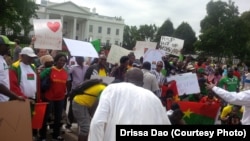Washington-based Burkina Faso citizens and friends of Burkina Faso held a demonstration in front of the White House Sunday to say “no” to the military takeover in their country and “yes” to the scheduled October 11 presidential election.
Meanwhile, Economic Community of West African States (ECOWAS) mediators led by chairman and Senegalese President Macky Sall late Sunday proposed a new and more inclusive election in November.
The proposal would restore the civilian transitional authority, while offering amnesty to the coup leaders. ECOWAS leaders are expected to meet Tuesday in Abuja to discuss the proposal.
Paul Sankara, younger brother of the late President Thomas Sankara, said demonstrators at the White House Sunday called on President Barack Obama to demand the unconditional reinstatement of the transitional government led by Michel Kafando.
“The main purpose is to, without discussion, ask the Obama administration to use the tools and power that it has to get rid of these criminals in Burkina Faso. The coup d’état that occurred this year on September 16 is unacceptable. Two weeks away from elections,” he said.
The United States is on record condemning what national security adviser Susan Rice called “the unconstitutional seizure of power by elements of the Presidential Security Regiment in Burkina Faso." She said the United States calls "on the responsible parties to release immediately those being detained, order aligned forces to stand down, respect the rights of civilians to peacefully assemble, and put Burkina Faso back on the path to presidential elections in October”.
In a statement last week, Rice said the “United States will continue to work with our partners, including the Economic Community of West African States, the African Union, and the United Nations, to bring about a peaceful resolution”.
Sankara welcomed the mediation efforts by West African leaders, but he said there should be no amnesty for the coup leaders because the military should stay out of the nation’s political process.
“So far what I have received through the media, the conditions that have been proposed by the military junta leader [Gen. Gilbert] Diendere, there should be no discussion about that. There is no amnesty; someone has to be responsible for the more than 25 people killed,” Sankara said.
Junta leader Diendere had said that one of the reasons he overthrew the transitional government was because it had excluded supporters of former President Blaise Compaore from participating in the scheduled October 11 election.
Sankara said it is not the military’s place to decide who participates or should not participate in elections. In addition, he said the provision barring some people from taking part in the election was accepted by President Blaise Compaore in 2012.
“It’s not just Burkinabe law; it’s African Union law. Those who participated to stop the process of democracy cannot anymore participate in the election,” Sankara said.
Besides, Sankara said the rule does not apply to the whole Compaore party but rather to some members of the party.
“The transitional Supreme Court didn’t say no to the party itself, but the name that the party proposed as its candidate had been denied based on African Union law. If you had done something before against the democratic process, you cannot take part in the election,” Sankara said.
Sankara said civil society groups and labor unions in Burkina plan in Burkina Faso plan to continue their protests until the military is forced out of power.
He said labor unions have told workers to stay away from work until General Diendere and his junta step down unconditionally.










